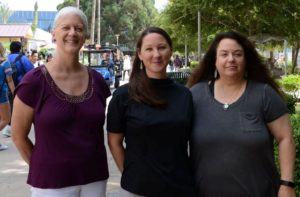
Pullias Center Announces Winners of Delphi Awards
Teams from Penn State University and Santa Monica College to be honored for innovative support of adjunct faculty in promoting student success
The Pullias Center for Higher Education at the University of Southern California’s Rossier School of Education has selected two winners of the Delphi Award for 2019. Collaborative teams from the Penn State University of four year-institutions, and the two-year Santa Monica College in Southern California will each receive $15,000 cash awards to continue their work to support adjunct, contingent, and non-tenure-track faculty in promoting student success.
This is the second year for The Delphi Award, an initiative of the Delphi Project on the Changing Faculty and Student Success at the Pullias Center, with the center’s director, Adrianna Kezar, as primary investigator. The award, funded by a grant from the Teagle Foundation, is an extension of the Delphi Project’s mission to bring attention to changing faculty trends and use research and data to better support faculty off the tenure track while helping create new faculty models for postsecondary institutions to adopt. The USC Pullias Center for Higher Education has worked in partnership with Association of American Colleges & Universities (AAC&U) on The Delphi Project since the project’s inception in 2012, developing reports and resources, collecting models, and conducting research and advocacy on this issue.
“The success of colleges and universities depends on, among other things, having great faculty who are supported to do their best work,” states Kezar, who stepped into the Pullias Center’s director role earlier this year after serving as co-director for 7 years. “With contingent faculty making up the majority of faculty at these institutions, it becomes vital to the overall health of higher education to focus on improving working conditions for non-tenure-track faculty. This award serves as an important recognition to those individuals, groups, and institutions championing this often under-appreciated faculty segment.”
Instructional faculty in American higher education is mostly comprised of non-tenure-track positions responsible for teaching the vast majority of college and university classes. These instructors are typically hired on shorter notice, for shorter terms, and lower pay than tenured or tenure-track faculty, while being offered no orientation or professional development. The result is many of these instructors are often tasked with balancing heavy teaching loads at multiple institutions despite limited time to prepare courses and limited support to improve their curriculum design or pedagogy – factors shown by Delphi Project research to correlate with lower student success rates.
Instructors Joelle Adams, Diane Arieff, and Catherine Matheson at Santa Monica College, a community college in the greater Los Angeles area, received the award for their work to expand events for part-time instructors that foster connections and offer easier access to information they consider essential but lacking.
“Part-time instructors are committed to their students,” Arieff said, “but their schedules are tight, and many find themselves teaching at more than one school. The goal is to integrate them into SMC in ways that are enriching, responsive, and that recognize what they have to offer.” Adams agreed. “Adjuncts teach the majority of classes at SMC,” she said. “Their development has a direct effect on student learning, success, and experience.”

A collaborative team of instructors and administrators at Penn State University have also been selected as 2019 Delphi Award recipients for their three-year push that culminated in the radical overhaul of Penn State’s policy governing faculty appointments, a change that benefited over 3,000 non-tenure track faculty across 24 campuses. This included establishing a consistent and professionalized title and rank system for teaching faculty, setting standard promotion procedures, such as structured compensation increases during promotions, and forming committees made up of NTTF responsible for the evaluation of NTTF promotions on each campus.
“We were able to affect change on an unprecedented level of scale and scope,” noted Laura Cruz, one of the team’s members who took the lead on submitting the program for The Delphi Award. “Our extensive efforts have the potential to serve as a rich source of evidence and practice for a range of change strategies to be implemented at other universities.”
Representatives from the winning institutions will officially receive their awards at the 2020 Association of American Colleges & Universities annual meeting on January 22-25 in Washington, DC.
“Disinvestments on the part of state systems in public institutions and burgeoning costs of independent colleges have led to an increasing reliance on contingent faculty in all types of institutions,” said AAC&U President Lynn Pasquerella. “Honoring non-tenure track faculty and their distinctive contributions reflects a recognition that student success is dependent upon the engagement of all faculty, while drawing attention to the need for colleges and universities to play a leadership role in advancing equity.”
The winners’ stories will continue to be told through upcoming case studies and other media. Nominations and applications for the next round of the Delphi Award will open February 2019.
More information on the current status of non-tenure track faculty can be found in the State of the Faculty report recently released by The Pullias Center. Additional tools and resources from the Pullias Center and The Delphi Project to assist campuses in supporting non-tenure track faculty include Departmental Cultures and Non-Tenure-Track Faculty: A Self-Assessment Tool for Departments and Non-Tenure-Track Faculty on our Campus: A Guide for Campus Task Forces to Better Understand Faculty Working Conditions and the Necessity of Change. Additionally, case studies of last year’s award-winning projects are also available on the Pullias Center website.